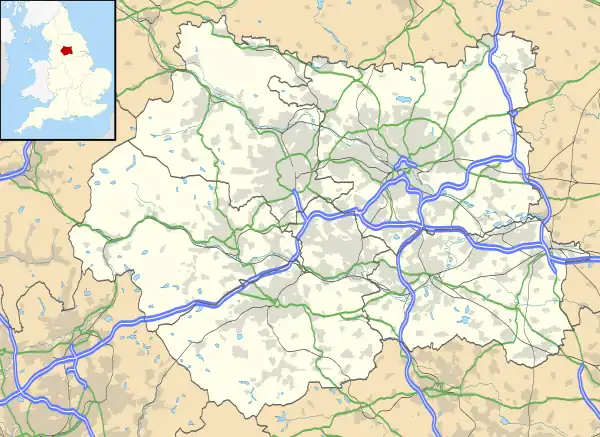| Pontefract Town Hall | |
|---|---|
.JPG.webp) Bridge Street elevation | |
 Shown in West Yorkshire | |
| General information | |
| Architectural style | Jacobean |
| Classification | |
Listed Building – Grade II | |
| Designated | 15 November 1988 |
| Reference no. | 1184866 |
| Town or city | Pontefract |
| Country | England |
| Coordinates | 53°41′34″N 1°18′36″W / 53.6929°N 1.3100°W |
| Completed | 1882 |
| Design and construction | |
| Architect(s) | Henry Perkin and George Bertram Bulmer |
Pontefract Town Hall is a town hall in Pontefract, West Yorkshire, England. It was completed in 1882. It is now owned and used by Wakefield Council as a registry office. The building has been Grade II listed since 15 November 1988.[1]
History
The present building was commissioned by Pontefract Borough Council as the new assembly rooms for the town after the council deemed the old town hall to be insufficient for their then requirements, especially for concerts, balls and public meetings.[2] A design competition was arranged and the winning design was selected for the new assembly rooms following a competition for which 59 entries were submitted.[2] The building was designed by Henry Perkin and George Bertram Bulmer of Leeds and completed in 1882.[3]
The civic leaders and magistrates started to hold their meetings in the assembly rooms from the early 20th century.[4] The building remained the meeting place for Pontefract Borough Council but ceased to be the local seat of Government when the enlarged Wakefield Metropolitan District Council was formed in 1974.[5] The building was the subject of an extensive restoration programme in 1996.[6][7]
Since it was formed by the then Vicar of St. Giles Church, the Reverend Jack Peel, in 1949, the St. Giles with St. Mary's Pantomime and Theatre Society have been staging pantomimes in the assembly rooms.[8] Performances in the 1950s included a pantomime based on a folk tale from One Thousand and One Nights entitled Aladdin;[9] more recent performances have included a pantomime based on another folk tale from One Thousand and One Nights entitled Sinbad the Sailor in 2011[10] and a pantomime based on a fairy tale by Hans Christian Andersen entitled the Snow Queen in 2020.[11][12]
Architectural style
Exterior
The building is of red brick in Flemish bond dressed with ashlar sandstone and a steeply-pitched Welsh slate roof and is Jacobean in style. The Bridge Street facade has one bay and a leaved panelled door situated below a fanlight under a round-arched portal with datestone.[1]
Interior
There is a central entrance hall with staircase leading up to the first floor which has a galleried assembly room.[1] The assembly room has a gallery with decorative panels to gallery front and an arched ceiling with transverse ribs.[1]
See also
References
- 1 2 3 4 Historic England. "Town Hall (1184866)". National Heritage List for England. Retrieved 3 May 2020.
- 1 2 "Pontefract and its Town Hall". Building News. 14 January 1881. Retrieved 3 May 2020.
- ↑ "Town Hall and Assemby Rooms". Pontefract Civic Society. Retrieved 6 August 2020.
- ↑ "Heritage Tour". Pontefract Voice. 31 August 2017. p. 13. Retrieved 6 August 2020.
- ↑ "Local Government Act 1972". Legislation.co.uk. Retrieved 3 May 2020.
- ↑ "Pontefract Town Hall". Experience Wakefield. Retrieved 6 August 2020.
- ↑ "Pontefract Town Hall". Wakefield Council. Retrieved 6 August 2020.
- ↑ "About Us". St Giles with St Mary's Pantomime and Theatre Society. Retrieved 6 August 2020.
- ↑ "St Giles' Church pantomime Aladdin, at Pontefract Assembly Rooms in the 1950s". Wakefield Council. Retrieved 6 August 2020.
- ↑ "The History of Pantomime". Britevents. 2011. Retrieved 6 August 2020.
- ↑ "Tickets on sale for popular Pontefract community pantomime". Pontefract and Castleford Express. 10 January 2020. Retrieved 6 August 2020.
- ↑ "Pontefract Events 2020" (PDF). Pontefract Civic Society. Retrieved 6 August 2020.